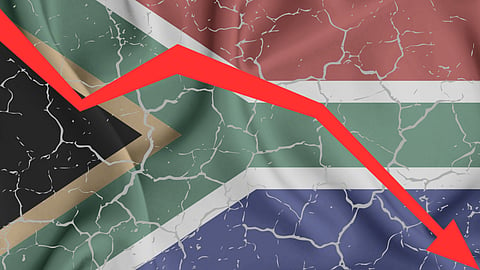SA faces threat of sanctions over Russia-Ukraine stance: Consequences could prove catastrophic Reserve Bank warns
Following the ANC government's reaffirmed stance of non-alignment on Russia's invasion of Ukraine, South Africa's central bank has issued a stern warning about the potential ramifications of sanctions. The SARB cautions that if SA were to face censure, it could result in secondary sanctions, leading to a halt in capital inflows and increased outflows, with the country's financial system at risk of being unable to function. The implications of such sanctions could include the possibility of being banned from international payment systems, and potential damage to trade relations and investor confidence. With the local challenges of ongoing loadshedding and an already declining economic growth, the additional pressure of international sanctions could prove catastrophic for the economy.
South African Central Bank Sounds Alarm on Threat of Sanctions
South Africa's central bank has warned of dire consequences should the country face censure due to its stance on Russia's invasion of Ukraine
At worst, secondary or indirect sanctions could be imposed on the country and lead to a sudden halt to capital inflows and increased outflows, the bank said in its latest financial stability review published on Monday. It cautioned that South Africa's financial system would be unable to function if its ability to make international payments in dollars was impeded.
More than 90% of South Africa's international payments are currently processed through the Society for Worldwide Interbank Financial Telecommunication system, Herco Steyn, the lead author of the report told reporters. "Should South Africa be banned from SWIFT as a result of secondary sanctions, these payments will not be possible," he said.
South Africa has adopted what it says is a non-aligned stance toward the war in Ukraine and it has abstained from several United Nations votes condemning Russia's actions. Its neutrality was called into question this month, when US Ambassador Reuben Brigety accused Pretoria of supplying weapons to Russia.
Diplomatic Furore
While President Cyril Ramaphosa denied the allegation, the diplomatic furor that ensued sparked fears that trade worth billions of dollars could be placed at risk and the rand fell to a record low against the dollar.
The row "could further exacerbate declining domestic financial market depth and liquidity and further erode investor confidence and sentiment if considered alongside the Financial Action Task Force greylisting and the country's inability to arrest the growing prevalence of loadshedding" Steyn said, referring to the local term for power cuts.
Even if the nation isn't sanctioned, the threat alone could mean the country's financial institutions are subjected to more intensive scrutiny by their foreign counterparts, said Nicola Brink, the head of the central bank's financial stability department.
"They start derisking South Africa essentially, which means that even if nothing happens there is already some effect, with risk premia increasing, she said in an interview.
Other key risks of South Africa being sanctioned include:
- It may be impossible to finance any trade or investment flows or to make or receive any payments from correspondent banks in dollars.
- South Africa is highly dependent on foreign investment inflows to fund its current-account deficit and those could dry up.
- South Africa's relations with its main trading partners could be damaged and it could lose its preferential trade access.
South Africa has already fallen out of favor with many offshore investors, with foreigners currently holding 25% of local government bonds, down from as much as 42% in 2018, the report said.
The biggest risk to the country's financial system remains sustained power cuts that are negatively impacting on domestic economic growth, investor sentiment and business activity, and exacerbating other pre-existing vulnerabilities, according to the bank.
It noted that there had been at 13,000 gigawatt hours of outages between January and May 21, surpassing the 11,697 gigawatt hours of cuts for the whole of 2022.
Read also:
- Secretary-General Mbalula dodges accountability as SA's problems continue to pile up – Ivo Vegter
- SA on international stage: Ramaphosa's ill-fated peace mission, a desperate distraction amidst scandals and failures
- SA in Bloomberg global newsletter's spotlight: "Embracing Putin is a gamble"
- Godongwana: US won't sanction SA over weapons row
© 2023 Bloomberg L.P.

